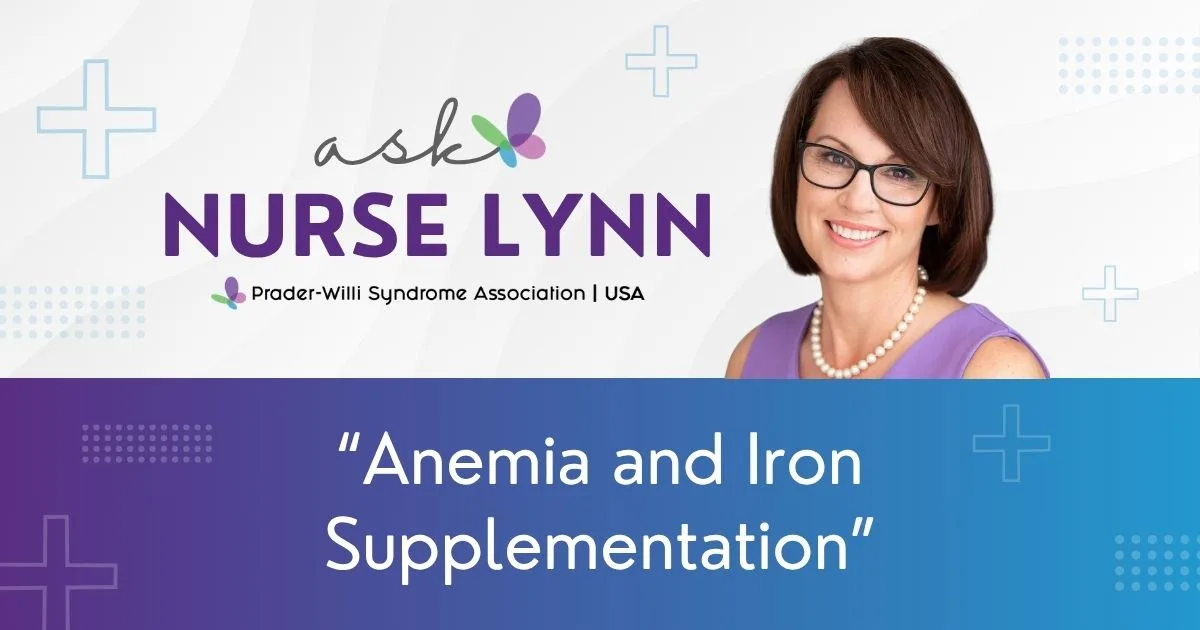Question:
Female, 22 years old, unknown subtype
Hello, my daughter has severe rectal picking issues to the point she is anemic. Got it under control in June 2023. Latest labs show anemia Ferritin at 6 Iron total at 13 hemoglobin at 11.2…doc said increase iron supplement to 325mg. My concern is it’s a new doc & not certain she’s on board with PWS issues. She has had iron infusion before. She’s lethargic, more anxiety & confusion as usual. Should I just ask for the iron infusion? Then I’ll research a new doctor.
Nurse Lynn’s Response:
Your daughter’s current symptoms and lab results are concerning, especially given her history of severe rectal picking, which can lead to chronic blood loss and iron deficiency in individuals with PWS. Although her rectal picking was brought under control in mid-2023, her recent labs show a ferritin of 6 ng/mL, total iron at 13 mcg/dL, and hemoglobin at 11.2 g/dL—all indicating significant iron deficiency anemia. These values, along with her current symptoms of increased lethargy, anxiety, and confusion, suggest that oral iron alone may not be sufficient—especially since oral iron can be poorly tolerated in PWS due to gastrointestinal side effects like constipation and reduced absorption.
The new physician’s recommendation to increase oral iron to 325 mg may be standard but given the complexity of PWS and her history of needing iron infusions, it is entirely reasonable to advocate for another infusion at this point. A ferritin level this low typically requires more aggressive repletion, particularly when cognitive and behavioral symptoms are worsening. If she has previously responded well to IV iron, this strengthens the case further. When speaking with her doctor, bring documentation of past infusions and their outcomes, and emphasize how PWS affects her healing, behavior, and pain perception.
If you feel your current provider isn’t familiar with the nuances of PWS, it would be appropriate to seek a second opinion from someone more experienced. In the meantime, continue to support her with a diet that includes iron-rich foods like cooked greens, lentils, eggs, and seeds—paired with vitamin C to improve absorption—while avoiding calcium-rich foods around iron intake. You may also consider requesting additional labs such as a full iron panel (including transferrin saturation and TIBC), B12 and folate levels, thyroid function, and inflammation markers to get a fuller picture. If needed, we can help connect you with PWS-informed providers or arrange a consult for your current physician.
Do you have a non-emergency medical question for Nurse Lynn? Submit your question here:
Share this!





 Perry A. Zirkel has written more than 1,500 publications on various aspects of school law, with an emphasis on legal issues in special education. He writes a regular column for NAESP’s Principal magazine and NASP’s Communiqué newsletter, and he did so previously for Phi Delta Kappan and Teaching Exceptional Children.
Perry A. Zirkel has written more than 1,500 publications on various aspects of school law, with an emphasis on legal issues in special education. He writes a regular column for NAESP’s Principal magazine and NASP’s Communiqué newsletter, and he did so previously for Phi Delta Kappan and Teaching Exceptional Children. Jennifer Bolander has been serving as a Special Education Specialist for PWSA (USA) since October of 2015. She is a graduate of John Carroll University and lives in Ohio with her husband Brad and daughters Kate (17), and Sophia (13) who was born with PWS.
Jennifer Bolander has been serving as a Special Education Specialist for PWSA (USA) since October of 2015. She is a graduate of John Carroll University and lives in Ohio with her husband Brad and daughters Kate (17), and Sophia (13) who was born with PWS. Dr. Amy McTighe is the PWS Program Manager and Inpatient Teacher at the Center for Prader-Willi Syndrome at the Children’s Institute of Pittsburgh. She graduated from Duquesne University receiving her Bachelor’s and Master’s degree in Education with a focus on elementary education, special education, and language arts.
Dr. Amy McTighe is the PWS Program Manager and Inpatient Teacher at the Center for Prader-Willi Syndrome at the Children’s Institute of Pittsburgh. She graduated from Duquesne University receiving her Bachelor’s and Master’s degree in Education with a focus on elementary education, special education, and language arts. Evan has worked with the Prader-Willi Syndrome Association (USA) since 2007 primarily as a Crisis Intervention and Family Support Counselor. Evans works with parents and schools to foster strong collaborative relationships and appropriate educational environments for students with PWS.
Evan has worked with the Prader-Willi Syndrome Association (USA) since 2007 primarily as a Crisis Intervention and Family Support Counselor. Evans works with parents and schools to foster strong collaborative relationships and appropriate educational environments for students with PWS. Staci Zimmerman works for Prader-Willi Syndrome Association of Colorado as an Individualized Education Program (IEP) consultant. Staci collaborates with the PWS multi-disciplinary clinic at the Children’s Hospital in Denver supporting families and school districts around the United States with their child’s Individual Educational Plan.
Staci Zimmerman works for Prader-Willi Syndrome Association of Colorado as an Individualized Education Program (IEP) consultant. Staci collaborates with the PWS multi-disciplinary clinic at the Children’s Hospital in Denver supporting families and school districts around the United States with their child’s Individual Educational Plan. Founded in 2001, SDLC is a non-profit legal services organization dedicated to protecting and advancing the legal rights of people with disabilities throughout the South. It partners with the Southern Poverty Law Center, Protection and Advocacy (P&A) programs, Legal Services Corporations (LSC) and disability organizations on major, systemic disability rights issues involving the Individuals with Disabilities Education Act (IDEA), Americans with Disabilities Act (ADA), and the federal Medicaid Act. Recently in November 2014, Jim retired.
Founded in 2001, SDLC is a non-profit legal services organization dedicated to protecting and advancing the legal rights of people with disabilities throughout the South. It partners with the Southern Poverty Law Center, Protection and Advocacy (P&A) programs, Legal Services Corporations (LSC) and disability organizations on major, systemic disability rights issues involving the Individuals with Disabilities Education Act (IDEA), Americans with Disabilities Act (ADA), and the federal Medicaid Act. Recently in November 2014, Jim retired.